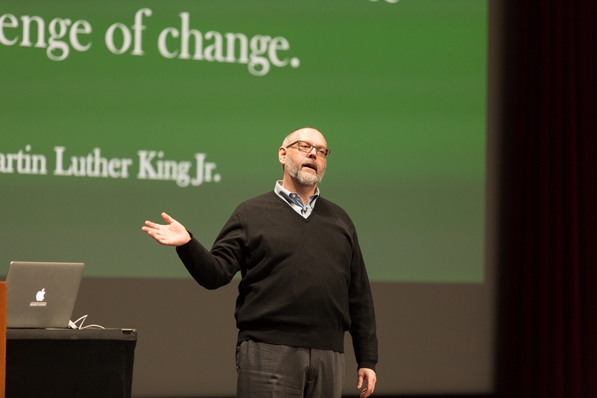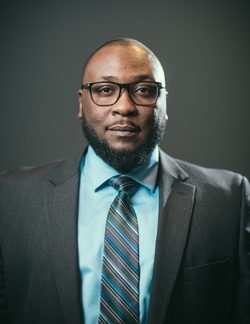As Dartmouth engages in a conversation about how to broaden diversity across the student body, in the faculty ranks, and among staff, it is critical to translate discussion into action, said Executive Vice President Rick Mills at a town hall meeting Jan. 20.

“If we fix diversity, but don’t do anything about inclusion, we haven’t done anything. It’s just wallpaper,” said Executive Vice President Rick Mills at the Jan. 20 town hall meeting. (Photo by Eli Burakian ’00)
“The question is how to stop talking about our aspirations for diversity and begin to make change,” Mills said at the noontime meeting in Spaulding Auditorium. The event was part of a regular series of community conversations launched by Mills in October 2014.
To that end, Mills has charged Chief Human Resources Officer Scot Bemis to review existing efforts to foster greater diversity among Dartmouth’s staff, the portion of the College over which the executive vice president has administrative authority, and to provide metrics for accountability and suggestions for enhancement.
Working with Bemis will be Ahmed Mohammed, the newly appointed director of talent acquisition. Mohammed, who left the Dartmouth human resources department three years ago to take a recruitment job at Harvard, has returned to Hanover to manage the College’s staff diversity recruitment effort.

Ahmed Mohammed, Dartmouth’s director of talent acquisition, is managing the College’s staff diversity recruitment effort. (Photo by Robert Gill)
“When Scot called me about this position I was excited to come back. Scot and Rick Mills want to make this happen, and they are not afraid to take risks,” Mohammed said in an interview after the town hall meeting.
Speaking to some 150 people gathered in Spaulding, Mills encouraged employees to think about how to bring a broader range of outlooks and backgrounds into their own work areas, and he encouraged staff to share ideas for change.
“It can be an uncomfortable conversation, but that’s not a reason not to have it,” Mills said.
He said members of the Dartmouth community must examine the College culture and ask themselves whether colleagues from minority and other underrepresented groups feel at home here.
“If we fix diversity, but don’t do anything about inclusion, we haven’t done anything. It’s just wallpaper,” Mills said.
The work of Bemis and Mohammed is part of the overall effort to enhance diversity and inclusion at the College, said Mills. Efforts to improve recruitment and retention of under-represented groups in the faculty and the student body will go on simultaneously, with Provost Carolyn Dever and Evelynn Ellis, vice president for Institutional Diversity and Equity (IDE), overseeing the college-wide effort.
‘Inspiring and Bracing’
The town hall meeting began with a presentation by Matthew Slaughter, the Paul Danos Dean of the Tuck School of Business, looking at Tuck’s position today and envisioning the future of the business school.
Slaughter, the Earl C. Daum 1924 Professor of International Business, assumed his role as the 10th dean of Tuck on July 1, 2015, succeeding Paul Danos, who served at the helm of the business school for 20 years.
Slaughter said Tuck’s place among the top 10 business schools in the world is something to celebrate, but cautioned that it cannot be a reason for complacency.
“I remind people that central to our success has long been innovation,” he said.
Read more
Town Hall Session Tackles the New World of Higher Ed
In fact, he said, when Edward Tuck brought the idea for an institution of advanced studies in business leadership to Dartmouth President William Jewett Tucker at the turn of the last century, it was unlike anything seen before: Tuck became the first graduate business school in the world.
Imagining the future of the business school is “a blend of inspiring and bracing,” he said.
The percentage of non-U.S. students and students under age 25 applying to Tuck is rising, while the percentage of graduates seeking jobs in the U.S. has declined.
“The world, due to globalization, is moving away from what we do at Tuck,” Slaughter said.
In the midst of these trends, technology and the emergence of online education and massive open online courses (MOOCs) have disrupted the traditional residential college model.
But by embracing these changes, and using distance learning as a conduit for students ready to work at a deeper level in a collaborative atmosphere, “we are making what we offer here more valuable, not less,” he said.
Central to this is fostering the idea of Tuck as a base camp, not a summer camp, he said, while leveraging the value of the foundational liberal arts skills of communication, writing, discourse, and dialogue. And achieving greater diversity will further enhance the Tuck experience, he said.
